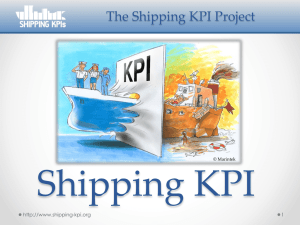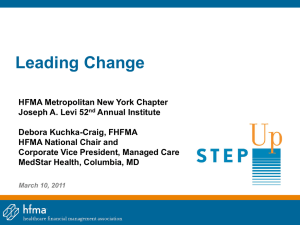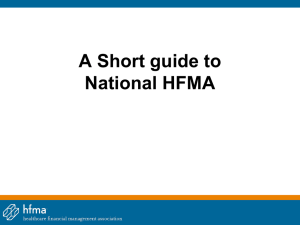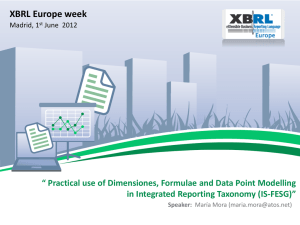Practical Information for Your Revenue Cycle
advertisement
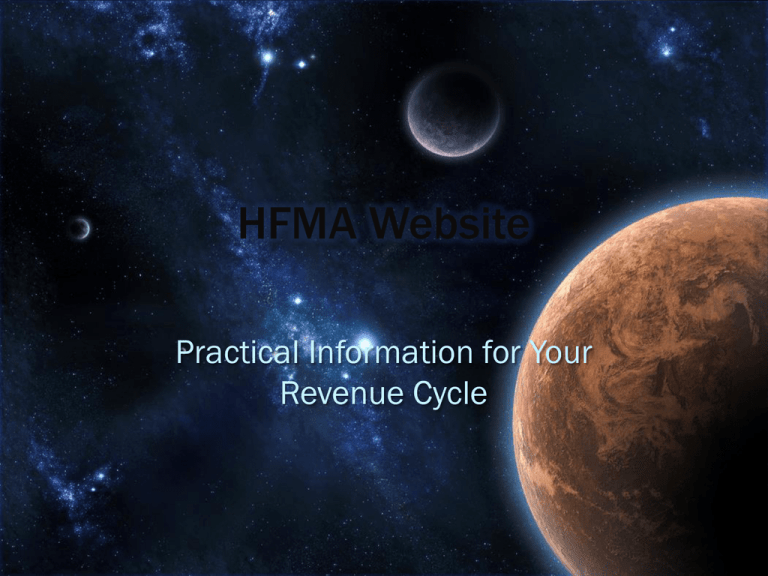
HFMA Website Practical Information for Your Revenue Cycle Objectives • Discover HFMA Website’s Information • Demonstrate Practical Application of the information • Challenge - Do! Discover Site Layout • The Site Layout Includes the following: – – – – – – – – – Knowledge Center * Education & Events * Publications * HFMA Initiatives &* Career Center * New & Opinion * Marketplace * Communities * About HFMA Discover Knowledge Center Discover Knowledge Center • The Knowledge Center has a plethora of information in the following categories: – Accounting and Financial Reporting – Finance and Business Strategy – Legal and Regulatory Compliance – Operations Management – Payment, Reimbursement, and Managed Care * – Revenue Cycle * – Technology * Discover • There are areas that relate to Revenue Cycle in Knowledge Center, but the the HOT ones are: – Legal and Regulatory Compliance – Payment, Reimbursement, and Managed Care – Technology Discover • The Area of Greatest Interest for Revenue Cycle Leaders? The Revenue Cycle Category!!! Discover – Knowledge Center Revenue Cycle * • • • • • • • • Bad Debt Billings and Collections Charity Care and Financial Counseling CDM, Charge Capture and Coding Consumer-Directed Health Care Denials Management Patient Access Self-Payment Collection Discover Education &Events Discover Education &Events • Key pieces to this part of the site: • There are virtual conference trainings that are free. • Certification information is available • Credentialing for your Revenue Cycle Staff is available • Training Products (Mastering Customer Service and Revenue Cycle) Discover Publications Discover Publications • • • • • • • • • HFM Magazine * Healthcare Cost Containment Newsletter Revenue Cycle Strategist Newsletter * Strategic Financial Planning Newsletter Leadership Healthcare Finance Strategies E-Bulletin Career Opportunities E-Bulletin Patient Friendly Billing E-Bulletin Business of Caring Archives Discover HFMA Initiatives Discover HFMA Initiatives • • • • • • • • • HFMA’s MAP * The Value Project Principles and Practices Board Healthcare Reform Patient Friendly Billing * Healthcare Financial Pulse Research and Trends Financing the Future Coalitions Discover Career Center Discover Career Center • • • • Job Bank * Careers at HFMA Certification Subscribe to Career Opportunities Discover News & Opinion Discover News & Opinion • • • • It has Healthcare Finance News From the Chair and President HFMA News My favorite is the News Roundup (News from various sources talking about things that can impact Revenue Cycle) Discover Marketplace Discover Communities Discovering Communities • Revenue Cycle Forum * – More Article Access – More Tool Access – Ask Experts Questions – Participate in List Serve and Message Board Discover About HFMA Demonstrate?!?! • Your Revenue Cycle is a Mess • You can’t fix it RESISTANCE IS FUTILE!!! MAP Keys First Set Net Days in A/R Aged A/R as a Percentage of billed A/R Point-of-Service Collections Cost to Collect Cash Collections as a Percentage of Adjusted Patient Net Service Revenue • Bad Debt • Charity Care • Days in Total Discharged Not Final Billed (DNFB) • • • • • MAP Keys 2nd Set • Aged A/R as a % of Billed A/R by Payer Group • Day in Final Billed Not Submitted to Payer • Days in Total Discharged Not Submitted to Payer • Late Charges as % of Total Charges • Initial Denial Rate – Zero Pay • Initial Denial Rate – Partial Pay MAP Keys 2nd Set • • • • • Denial Overturned by Appeal Net Days Revenue in Credit Balance Pre-Registration Rate Insurance Verification Rate Service Authorization Rate MAP Application Home Page MAP Application Dashboard MAP Application KEY Briefs MAP Keys • Effective 12/01/10 MAP Application was made available. • Cost is based on size – Solo Facility – System • Not Necessary to Participate in MAP Award • MAP Keys bring standard definitions and purpose to enable providers to compare with like facilities MAP Keys • New KPI’s • Days in Final Billed Not Submitted to Payer (FBNS) tracks claims held by edits in claims processing system or secondary bills not sent out • Days in Total Discharged Not Submitted to Payer (DNSP) – Includes FBNS and DNFB KPI’s Revenue Cycle Questions Demonstrate HFMA Usefulness • Ecclesiastes 1:9 NIV “What has been will be again, what has been done will be done again; there is nothing new under the sun.” Jason’s Translation: Don’t recreate the wheel…Steal !!! Demonstrate KPI’s – Patient Access • Average Registration Time – unknown, but patient’s are complaining • Average Patient Wait Time – unknown. But patients and departments complaining • Average patient registrations per shift – Unknown • Registration Data Quality – Unknown but a lot of patient and business office complaints • MSPQs obtained – Accidentally eliminated Demonstrate Using KPI’s Access/Registration • Average registration interview duration < 10 minutes • Average patient Wait time < 10 Minutes • Average Registrations per shift (Varies by department and system - 35 inpatient 40 outpatient is Hammer’s KPI) • Data Quality 99% or better • ABN and MSPQ when Required 100% Demonstrate Wait time KPI’s • Requested Productivity Reports with Detailed Registration Start and Stop Times – The times seemed reasonable 80% of the time – 20% of the time there were significant waits • Worked with Staff and found that Incomplete Orders shut the process down • Designated an office individual to handle those situations with patient, physician and department • Increased percentage to 98% Demonstrate Wait Time KPI’s • Still had complaints – Volume of Accounts didn’t work due to rush periods and lulls after doing a traffic study. It wasn’t a productivity issue – Implemented a inexpensive check-in system • Patients were waiting a long time for lab services and surgical services – Implemented direct lab registration process – Implemented Quick-Registration for Surgical Patients • Significant improvement (except for lab patients at peak times) • Patient Access Perception Improved (Press Ganey) Demonstrate Data Quality • Complaints from Patient and Business Office – Implemented Individual Auditing – Scanned Cards and IDs for Identity Protection and to Audit Accuracy Demonstrate Date Quality Expect Staff to “Bomb” the first audits. They need to fully understand expectations. Scores will improve over time as staff see that quality is being monitored seriously Demonstrate Data Quality Demonstrate Compliance • If you don’t ask the question, you don’t know what is going on. • MSPQ’s were accidentally discontinued when an eligibility verification was implemented a year before. • Training occurred and the MSPQ was initiated immediately following. Demonstrate KPI - HIM • Hospital Scenario –Cash flow diminishing –HIM days at 10 –Coder productivity unknown –Un-coded charts > 30 unknown Demonstrate Using KPI’s HIM • All coding done is in descending balance order, not first in/first out. • Consistently monitor and control Discharged-Not-Final-Billed A/R due to HIM. • HIM “DRG development” D-N-F-B A/R days greater than the late charge hold ≤ 2 A/R days • Inpatient charts coded, per coder per day • 23 - 26 • Outpatient charts coded, per coder per day • 150 - 230 • Emergency room charts coded, per coder per day • 190 - 250 • All coding is done by employees who report to the HIM director. Demonstrate Using HIM KPI’s • Discovered that completed coding was being tracked by a paper report generated weekly. • Employee manually noted issues on paper. • High Balances were worked like low balances (No Pareto Principle gains) – Discovered a software add-on not used by hospital and created queues for each coder – Productivity Reports created – Coding Days began to drop except for outpatient Demonstrate Using HIM KPI’s • Discovered that Facility-Based Urgent Care coding happened on-site • Coder position was vacant and lead was coding when had time • Coding was 6 months behind – Used Scanning Technology to scan charts at site daily – Urgent Care coding position moved under HIM – Coding caught up – Increase Revenue due to coder put in charge for E/M codes Demonstrate Charge Entry/Revenue Protection • • • • Bill hold 6 days CDM duplicates - Unknown Incorrect CDM items – Unknown Item price less than HOPPS APC rate – Unknown Demonstrate Using CDM KPI’s • • • • Late Charge Hold Period 2-4 days CDM Duplicate 0 CDM Codes Incorrect/Missing CPT HCPCS 0 CDM item price less than HOPPS APC rate Demonstrate Using CDM KPI’s • Worked with Departments and taught department directors how to review rejected charge reports, revenue reports, and enforced late charge policy – Increase revenue and reduced late charges for many departments other lost their revenue already not being billed • Discovered duplicate and incorrect CDM codes and prices below APC rate –Some rates hadn’t been updated since going on the system 2 years prior – Updated CDM and improved revenue, payment, and billing compliance Demonstrate KPI’s Business Office • Discharge Not Final Billed (DNFB) 11.1 • A/R Days 58.5 Gross (67 Net) • Days in Total Discharge Not Submitted to Payer (DNSP) – Not Tracked • Days Final Billed Not Submitted to Payer (FBNS) • Insurance A/R aged more than 90 days from service/discharge 31% (w/o Self-Pay 19%) Demonstrate Using Business Office KPI’s • DNFB A/R days - 4-6 A/R days • Net A/R days - 55 A/R days • Insurance A/R aged more than 90 days from service/discharge 15-20% Demonstrate Using Business Office KPI’s Demonstrate Using Business Office KPI’s • Focused on reducing HIM unbilled days • Started Tracking Unbilled in Electronic Claims System – Discovered Electronic Claims were not counted in unbilled numbers – Discovered Secondary and printed claims not mailed were not counted in any numbers – Months of paper billing had been backlogged and some reaching filing limits Demonstrate Using Business Office KPI’s • HIM Days Started Going Down with HIM Focus and Tools • All Paper Claims starting going through Electronic Claims system for Tracking – Initially DNFB Days in PFS went up because of the new tracking – Additional Biller Training occurred to ensure billers knew how to get claims out the door. – OCR Remit scanning for paper remits began to assist with secondary billing – Cash increased due to bills starting to go out that were not going out previously – Instituted Collection Tool, Auditing, and Productivity Demonstrate Using Business Office KPI’s Demonstrate Using Business Office KPI’s • Over 90 Aging is now below 20% including Self-Pay • Over 90 excluding self-pay is below 6% • Total DNFB averages under 5 days • FBNS is under 1 day • DNSP is under 6 days on average • 7% Cash increase in FY 2009 Demonstrate Using Business Office KPI’s Physician Practices • 1. Visits without charges as % of total visits 0% • 2. Co-pay collections as % of total copay office visits $ 95% • 3. EDI claims as % of total claims $ 90% • 4. Charge-entry lag period - 1 business day • 5. Claims passing claim edits as % of total claims $ 98% Physician Practices • 6. Appointment no-show rate - 2-3% • 7. Appointment bumped rate - 2-3% • 8. Net A/R days (non-specialty practices) 40 days • 9. Collections as % of net revenue $100% • 10. Collections as % of gross revenue (nonspecialty practices) $ 60% Physician Practices • 11. Third-party A/R aging 90 days from service date - 10% • 12. Denials as % of net revenue (including “incidental to” services) - 2% • 13. Claims with no activity 90 days from last activity date 0% • 14. Credit balances - 2 A/R days • 15.Average patient wait time after office arrival - 15 minutes Certified Revenue Cycle Representatives • Received a Grant in 2010 to do LEAN Training and CRCR • 50% of staff that took the test certified • 90% of Patient Financial Services • Staff are more involved in fixing problems Challenge !! DO!!! • Choose a topic to research on HFMA site or take the MAP journey • Prioritize Issues Discovered (Compliance/Care/Cost Savings) • Study the topic or MAP Keys • Implement Changes – Set SMART Goals – Involve Staff (Devil is in the details) • Teach others (Leaders and staff) • Celebrate your success and tell your story Questions??

